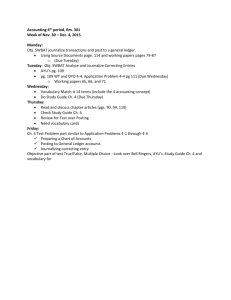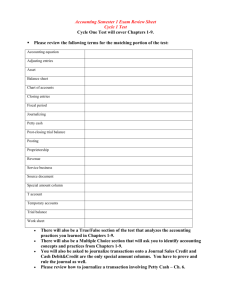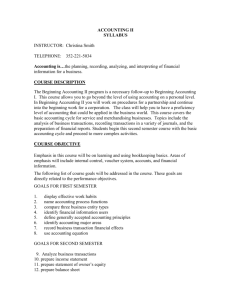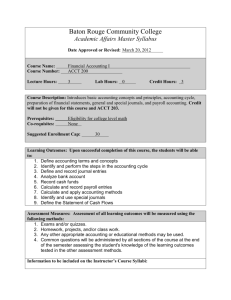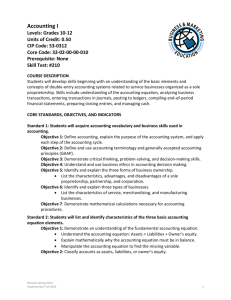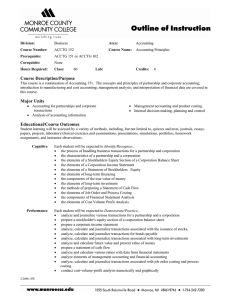El Paso Community College Syllabus Part II Official Course Description
advertisement
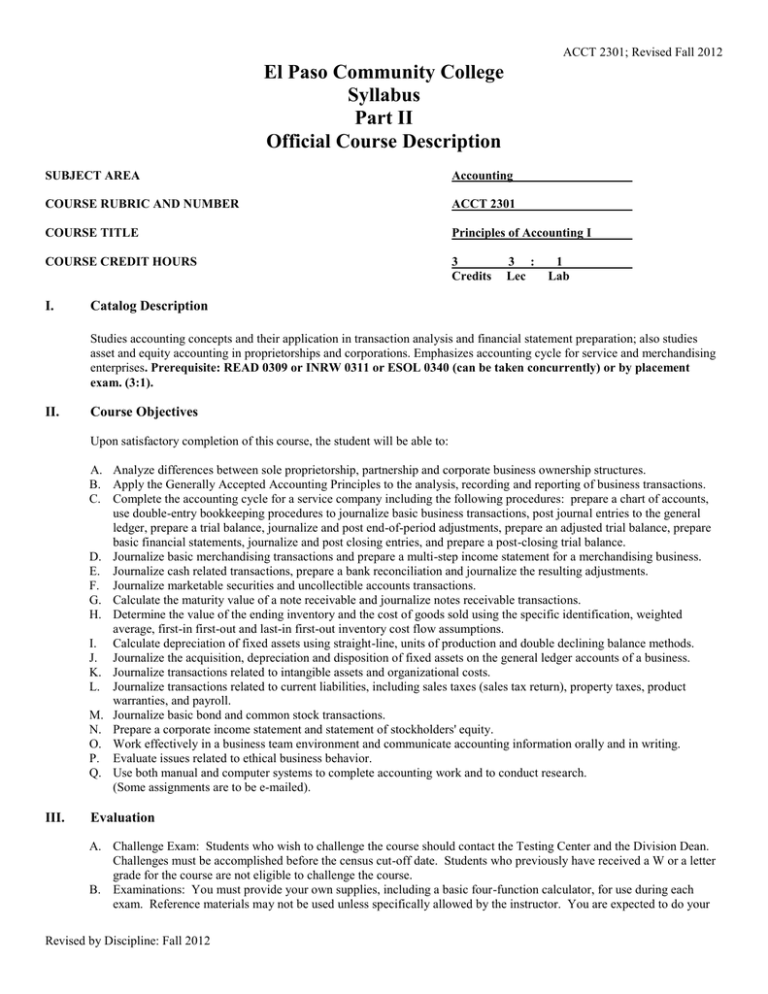
ACCT 2301; Revised Fall 2012 El Paso Community College Syllabus Part II Official Course Description SUBJECT AREA Accounting COURSE RUBRIC AND NUMBER ACCT 2301 COURSE TITLE Principles of Accounting I COURSE CREDIT HOURS 3 Credits I. 3 : Lec 1 Lab Catalog Description Studies accounting concepts and their application in transaction analysis and financial statement preparation; also studies asset and equity accounting in proprietorships and corporations. Emphasizes accounting cycle for service and merchandising enterprises. Prerequisite: READ 0309 or INRW 0311 or ESOL 0340 (can be taken concurrently) or by placement exam. (3:1). II. Course Objectives Upon satisfactory completion of this course, the student will be able to: A. Analyze differences between sole proprietorship, partnership and corporate business ownership structures. B. Apply the Generally Accepted Accounting Principles to the analysis, recording and reporting of business transactions. C. Complete the accounting cycle for a service company including the following procedures: prepare a chart of accounts, use double-entry bookkeeping procedures to journalize basic business transactions, post journal entries to the general ledger, prepare a trial balance, journalize and post end-of-period adjustments, prepare an adjusted trial balance, prepare basic financial statements, journalize and post closing entries, and prepare a post-closing trial balance. D. Journalize basic merchandising transactions and prepare a multi-step income statement for a merchandising business. E. Journalize cash related transactions, prepare a bank reconciliation and journalize the resulting adjustments. F. Journalize marketable securities and uncollectible accounts transactions. G. Calculate the maturity value of a note receivable and journalize notes receivable transactions. H. Determine the value of the ending inventory and the cost of goods sold using the specific identification, weighted average, first-in first-out and last-in first-out inventory cost flow assumptions. I. Calculate depreciation of fixed assets using straight-line, units of production and double declining balance methods. J. Journalize the acquisition, depreciation and disposition of fixed assets on the general ledger accounts of a business. K. Journalize transactions related to intangible assets and organizational costs. L. Journalize transactions related to current liabilities, including sales taxes (sales tax return), property taxes, product warranties, and payroll. M. Journalize basic bond and common stock transactions. N. Prepare a corporate income statement and statement of stockholders' equity. O. Work effectively in a business team environment and communicate accounting information orally and in writing. P. Evaluate issues related to ethical business behavior. Q. Use both manual and computer systems to complete accounting work and to conduct research. (Some assignments are to be e-mailed). III. Evaluation A. Challenge Exam: Students who wish to challenge the course should contact the Testing Center and the Division Dean. Challenges must be accomplished before the census cut-off date. Students who previously have received a W or a letter grade for the course are not eligible to challenge the course. B. Examinations: You must provide your own supplies, including a basic four-function calculator, for use during each exam. Reference materials may not be used unless specifically allowed by the instructor. You are expected to do your Revised by Discipline: Fall 2012 ACCT 2301; Revised Fall 2012 own work on the exams and are responsible to protect your work from copying. Anyone caught cheating will receive zero credit for that exam and be subject to disciplinary action as prescribed in the current EPCC catalog. C. D. E. F. G. H. I. IV. Exams require the solution of both procedure and theory problems. Exam formats may include multiple-choice, matching, fill in the blank, short-answer responses, essays, computational problems, practical application problems, manual accounting forms, and computerized spreadsheet and general ledger problems. Remediation: At the discretion of the instructor, students may be allowed to retest for higher grades. Assignments: All assignments should be completed on appropriate manual or online working papers with your name, course/section number, and assignment number. Manually prepared documents should be stapled in correct sequential order and have a neat, professional appearance. All written responses must be prepared using correct grammar, punctuation and spelling. Class and Lab Participation: Class participation is required and monitored. Lack of participation in class activities may subject the student to withdrawal from the course based on inadequate course pursuit. Chronic tardiness to class is not tolerated. Extended absences from class activity should be discussed with the instructor. At least 32 hours should be accumulated in the Business Lab by the end of the semester. The lab provides an independent study area where you can complete your accounting work, use the lab computers and calculators, view videos and receive assistance. Online students are strongly encouraged to make use of the Business Lab but physical attendance is not required. Course Pursuit: When the instructor determines that a student has ceased to pursue the objectives of the course, the instructor may withdraw the student from the course up to the official withdrawal deadline. To assess course pursuit by the student, the instructor will consider class and lab participation, failure to take exams and quizzes, failure to submit required work, and failure to complete other required class/lab/homework activities identified in the course syllabus. Withdrawal from Course: It is the student's full responsibility to withdraw by the official withdrawal deadline. The instructor may not readmit a student who voluntarily withdraws from the course. A student withdrawn for administrative reasons may not continue to attend class until readmitted into the course. All students remaining on the final class roster will receive a grade based on the total points accumulated by the end of the semester. Final Examination: The comprehensive final examination is mandatory for all ACCT 2301 classes and should count for at least 20% of the total course grade. Grading Scale: A = 90 – 100 I = Incomplete B = 80 - 89 W = Withdrew or withdrawn C = 70 - 79 D = 60 - 69 F = below 60 Disability Statement (American with/Disabilities Act [ADA]) EPCC offers a variety of services to persons with documented sensory, mental, physical, or temporary disabling conditions to promote success in classes. If you have a disability and believe you may need services, you are encouraged to contact the Center for Students with Disabilities to discuss your needs with a counselor. All discussions and documentation are kept confidential. Offices located: VV Rm C-112 (831-2426); TM Rm 1400 (831-5808); RG Rm B-201 (831-4198); NWC Rm M-54 (831-8815); and MDP Rm A-125 (831-7024). V. 6 Drop Rule Students who began attending Texas public institutions of higher education for the first time during the Fall 2007 semester or later are subject to a 6-Drop limit for all undergraduate classes. Developmental, ESL, Dual Credit and Early College High School classes are exempt from this rule. All students should consult with their instructor before dropping a class. Academic assistance is available. Students are encouraged to see Counseling Services if dropping because exemptions may apply. Refer to the EPCC catalog and website for additional information. Revised by Discipline: Fall 2012
